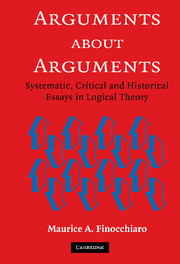Book contents
- Frontmatter
- Contents
- Preface and Acknowledgments
- Introduction : An Approach to a Branch of Logic
- Theorizing about reasoning and argument
- 1 Informal Logic and the Theory of Reasoning (1984)
- 2 An Historical Approach to the Study of Argumentation (1987)
- 3 Methodological Problems in Empirical Logic (1989)
- 4 Two Empirical Approaches to the Study of Reasoning (1994)
- 5 Critical Thinking, Critical Reasoning, and Methodological Reflection (1996)
- Fallacies and asymmetries
- Critiques
- Historical analyses
- Selected Bibliography
- Index
3 - Methodological Problems in Empirical Logic (1989)
from Theorizing about reasoning and argument
Published online by Cambridge University Press: 05 February 2015
- Frontmatter
- Contents
- Preface and Acknowledgments
- Introduction : An Approach to a Branch of Logic
- Theorizing about reasoning and argument
- 1 Informal Logic and the Theory of Reasoning (1984)
- 2 An Historical Approach to the Study of Argumentation (1987)
- 3 Methodological Problems in Empirical Logic (1989)
- 4 Two Empirical Approaches to the Study of Reasoning (1994)
- 5 Critical Thinking, Critical Reasoning, and Methodological Reflection (1996)
- Fallacies and asymmetries
- Critiques
- Historical analyses
- Selected Bibliography
- Index
Summary
Introduction
What I plan to do in this chapter is to elaborate a definition of empirical logic, and then to discuss a number of resulting methodological problems. These involve questions about the relationship among empirical logic so conceived and other orientations in logic, other approaches to the study of reasoning, and different conceptions of the empirical approach. One of the most fundamental of these problems is that of the relationship between empirical logic and the experimental psychology of reasoning, and so I shall focus on that, though not limit myself to it. To be more exact, I should speak of their lack of relationship, for it turns out that the laboratory experiments performed by cognitive psychologists are not really tests of reasoning; consequently, the experimental method will emerge as being of dubious value in empirical logic. If such a logic is to be feasible, it must follow some other approach. The one I find most fruitful is the historical-observational approach.
Conceptions of logic
Empirical logic may sound like a contradiction in terms since by logic one often means the domain of the non-empirical. However, an equally common meaning is that logic pertains to the domain of reasoning, and so an empirical logic becomes possible simply as an empirical approach to the study of reasoning.
Although the empirical study of reasoning is an old, indeed ancient, enterprise, the explicit and self-conscious use of the term “empirical logic” is relatively recent. It is due, I believe, to Arne Naess and Else Barth.
- Type
- Chapter
- Information
- Arguments about ArgumentsSystematic, Critical, and Historical Essays In Logical Theory, pp. 46 - 64Publisher: Cambridge University PressPrint publication year: 2005



